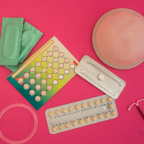Other Contraception
If you are struggling to find a contraceptive method that’s right for you, here at Essex Sexual Health Service we have knowledge on all forms of contraception.
Here we will describe different kinds of contraception which don’t get as much coverage, for those who wish to find an alternative.
Other contraceptive methods include monitoring your fertile windows, other physical barrier which prevent sperm and alternative ways of introducing hormones to your body which stop ovulation.
Other Contraception
If you are struggling to find a contraceptive method that’s right for you, here at Essex Sexual Health Service we have knowledge on all forms of contraception.
Here we will describe different kinds of contraception which don’t get as much coverage, for those who wish to find an alternative.
Other contraceptive methods include monitoring your fertile windows, other physical barrier which prevent sperm and alternative ways of introducing hormones to your body which stop ovulation.
Emergency Contraceptive Pill
The morning-after pill is a type of birth control that can be used to prevent pregnancy after unprotected sex. It contains synthetic hormones that stop or delay the release of the egg.
There are two common versions of the morning-after pill: Levonelle and ellaOne. Levonelle should be taken within 3 days of unprotected sex and ellaOne should be taken within 5 days. Neither is intended for regular use and you should avoid further unprotected sex while they are working.
There are no long-term or serious side effects associated with the morning-after pill. However, they may cause minor side effects such as headaches, stomach pain, nausea or some changes to your next period.
If you are taking regular birth control pills, you can continue to take them with Levonelle. However, you should wait 5 days if you take ellaOne.
Fertility Awareness
Fertility awareness – or natural family planning – is a way
of preventing pregnancy by tracking your menstrual cycle and avoiding sex or
using other contraception when you’re fertile.
If done correctly, natural family planning is 99% effective
at preventing pregnancy. However, it does require careful thought and
consistency – it also doesn’t protect you against sexually transmitted
infections (STIs).
To use natural family planning, you’ll need to keep a daily
record of your fertility signals, such as your temperature and the fluids
coming from your cervix. It can take a few menstrual cycles to get the hang of
it but once you do, it’s a great way to prevent pregnancy without using
hormones or other medications.
One of the benefits of natural family planning is that it’s
free and there are no side effects. However, it’s important to be aware that
your fertility signals can be affected by illness, stress and travel. If you’re
not sure if you’re fertile, it’s always best to use a condom or other form of
contraception.
It’s also important to remember that natural family planning
doesn’t protect against STIs. The best way to protect yourself against STIs is
to use a condom every time you have sex.
If you’re interested in learning more about natural family
planning, there are many resources available online and at your local sexual
health clinic.
Diaphragm or Cap
A diaphragm is a type of birth control that’s made from a round, dome-shaped piece of silicone which gets inserted into the vagina. It covers the cervix, which is the opening to the uterus, so that sperm can’t get in.
It’s important to use spermicide with a diaphragm, which is a cream or gel that kills sperm. Spermicide should be reapplied if you have sex again or the diaphragm is in place for more than 3 hours.
Diaphragms are about 92-96% effective at preventing pregnancy when used correctly. They don’t contain any hormones, so they don’t have any side effects. However, they’re not suitable for everyone, for example, you shouldn’t use a diaphragm if you have an allergy to latex or silicone.
It’s also important to remember that diaphragms don’t protect against sexually transmitted infections (STIs). The best way to protect yourself against STIs is to use a condom every time you have sex.
If you’re interested in learning more about diaphragms, there are many resources available online and at your local health clinic.
Vaginal Ring
A vaginal ring is a small, flexible plastic ring which gets inserted into the vagina. It releases hormones to help you prevent pregnancy.
The ring is usually left in for 21 days, it’s then removed for 7 days during your period. You can have sex with the ring in place.
One ring provides contraception for a month, after which it must then be replaced with a new one.
Vaginal rings are more than 99% effective at preventing pregnancy when used correctly and are a good option for people who don’t want to take a pill every day.
Side effects from vaginal rings are rare and usually go away after a few weeks and can include headaches, nausea and spotting between periods.
It’s also important to remember that vaginal rings don’t protect against sexually transmitted infections (STIs). The best way to protect yourself against STIs is to use a condom every time you have sex.
If you’re thinking about getting a vaginal ring, talk to your doctor, they can help you decide if it’s right for you and answer any questions you have.
Contraceptive Patch
The contraceptive patch is a small, sticky square that’s placed on the skin and slowly releases hormones into your body to prevent pregnancy.
The patch contains the same hormones as the combined pill – oestrogen and progesterone – which prevent the ovaries from releasing an egg each month (ovulation), thicken the mucus in the neck of the womb to make it harder for sperm to enter and thin the lining of the womb so that a fertilised egg cannot implant itself.
Each patch is typically worn for 7 days. After 3 weeks, you’ll take a 7-day break from wearing the patch. This is when you’ll have your period. Then, you’ll start a new patch cycle.
The patch is more than 99% effective at preventing pregnancy when used correctly and is a good option for people who don’t want to take a pill every day.
Side effects from the patch are rare and usually go away after a few weeks. They can include headaches, nausea and spotting between periods.
It’s also important to remember that the contraceptive patch doesn’t protect against sexually transmitted infections (STIs). The best way to protect yourself against STIs is to use a condom every time you have sex.
If you’re thinking about getting the contraceptive patch, talk to your doctor. They can help you decide if it’s right for you and answer any questions you have.
Using our online services:
Online access to all the sexual health services you need
Access free sexual health services at any time of the day through our dedicated online portal.
You can:
- Book and amend appointments
- Request STI self-testing kits
Phone Appointments
Discover what to expect from a consultation over the phone.
Clinic Appointments
Discover what to expect from a one-to-one consultation with a clinician.
FAQs
Clear answers to common questions
Contacting a sexual health service for the first time may be a little daunting, especially if you’re not keen on talking to someone. So, here are answers to some of the questions we get asked a lot.
What questions will be asked if I call the helpline?
You’ll be asked a few simple questions to understand your circumstances and the support you may need.
There is no rush, so take your time.
What support will I be offered?
We will support you in whatever way you need.
This may include talking through your situation, giving advice, helping you access things like protection or contraception, or organising a STI test.
What if I need a test?
We provide a quick and discreet STI self-testing kits for many of the most common infections.
If a different test is needed, we’ll help you with booking a confidential appointment at a local clinic.
Will I need a physical examination?
You may be invited to a confidential physical examination at one of our clinics, where a doctor will undertake any examination that’s needed.
You’ll be asked in advance if you are comfortable with the examination.
Who is told about my appointments or STI tests?
No one. Both your appointment and test result are completely confidential.
Your information is stored in a sexual health services medical record and is only shared with your GP or other professional if you agree.
How are tests taken?
If you do need to take a test, many can be taken from the comfort of your home by ordering one of our self-test kits – others may require a visit to a sexual health clinic.
You may be asked to provide either a urine or swab sample of the infected area or a blood sample may be needed in some cases. This will be explained before the test.
What if my test result is positive?
Firstly, please don’t worry, we deal with STIs all the time and almost all are now treatable.
You’ll be contacted by a professional to discuss your results and given advice on the treatment you may need.
In addition, we will offer any counselling and other forms of support you may need.










